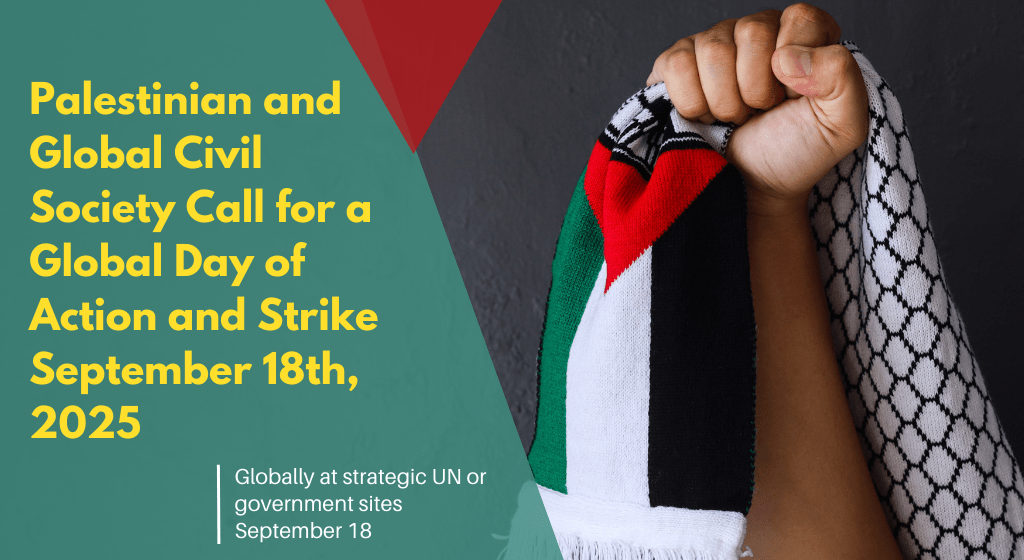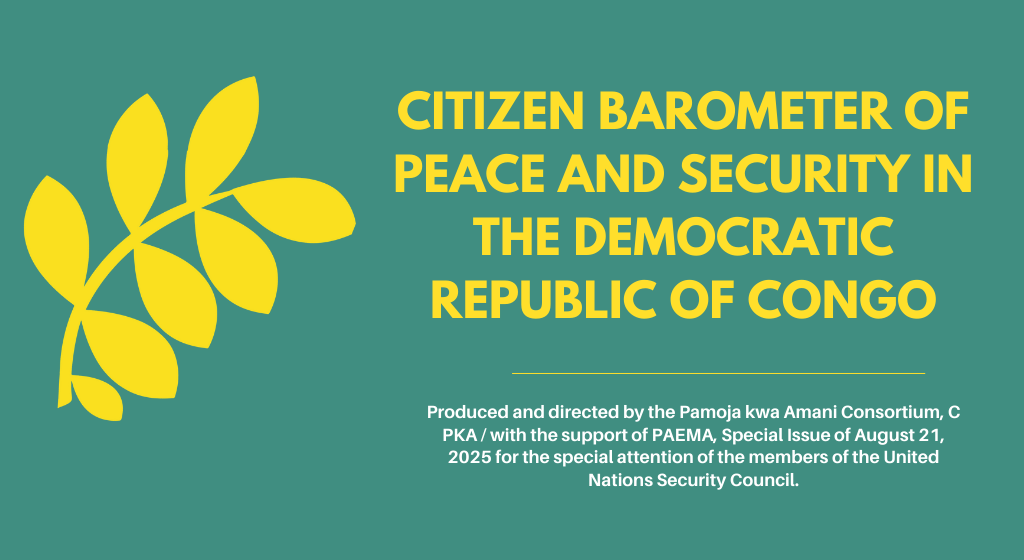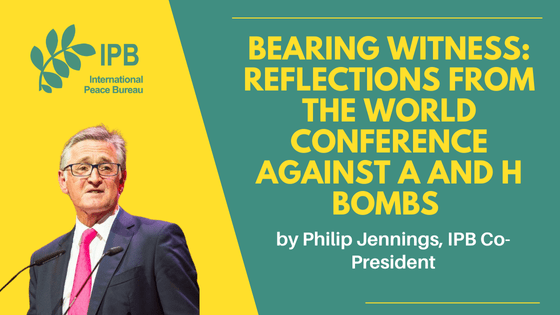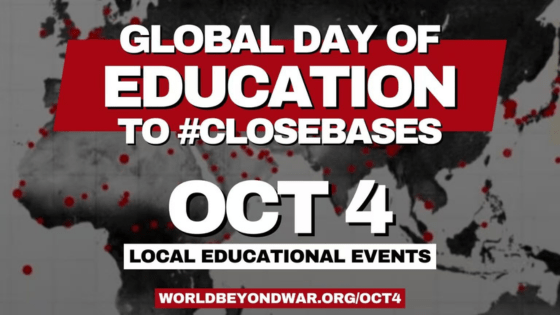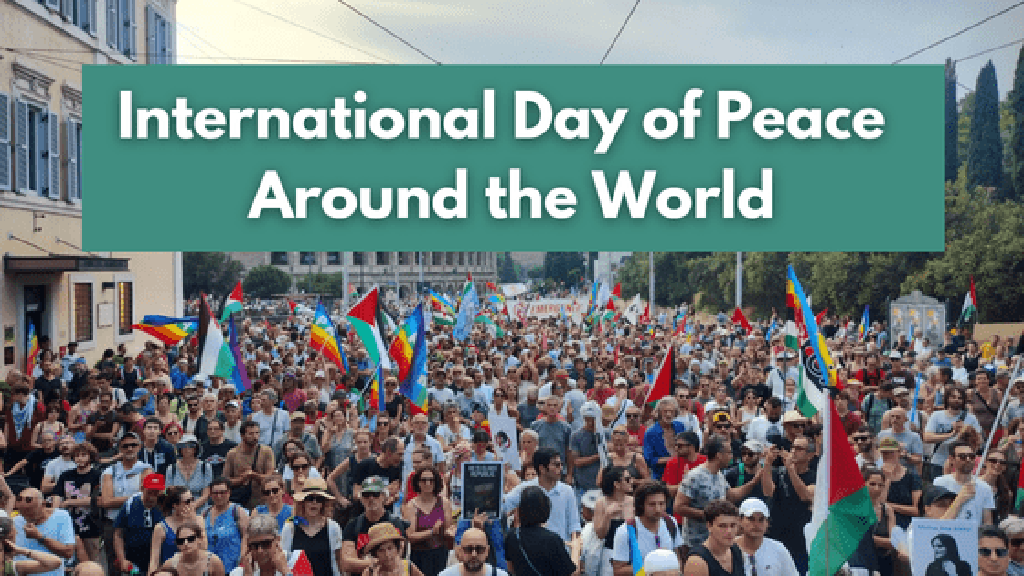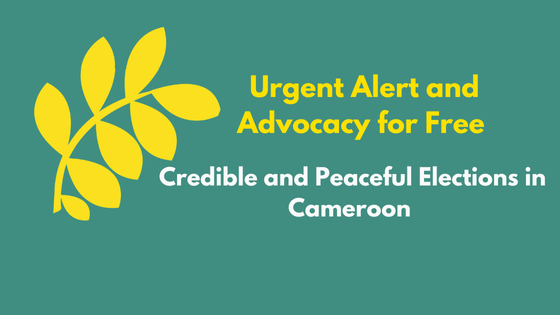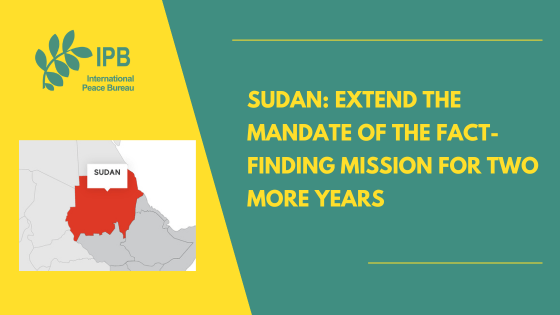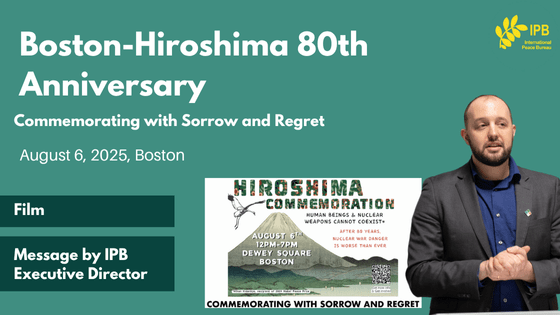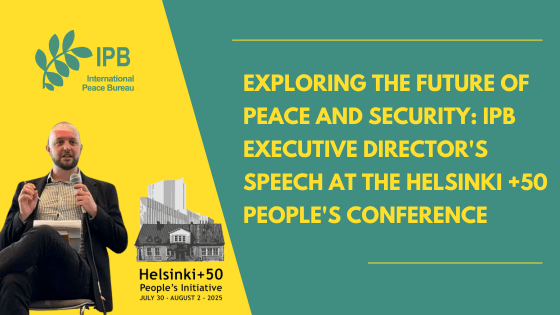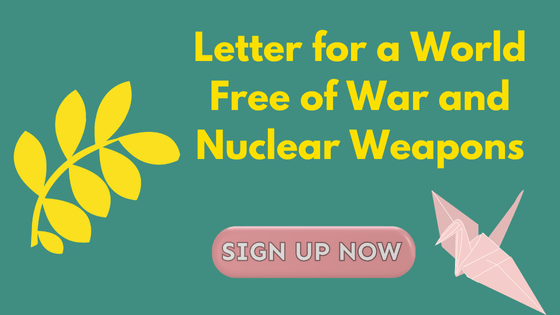On September 18, 2024, the United Nations General Assembly (UNGA) adopted Resolution A/ES-10/L.31, demanding Israel end its unlawful presence in the Occupied Palestinian Territory (OPT) within 12 months and to immediately comply with the provisional measures in the genocide case at the International Court of Justice (ICJ). Since then Israel has entrenched its occupation and escalated its genocidal attacks on Gaza causing the United Nations to declare famine in Gaza. The Palestinian NGO Network (PNGO) and Global Civil Society is calling for a Global Strike and Day of Action on September 18, 2025, to denounce Israel’s refusal to comply with this order, and to demand that UN member nations act immediately to end Israel’s genocide against the Palestinian people.
Continue reading “Palestinian and Global Civil Society Call for a Global Day of Action and Strike September 18th, 2025”Yesterdays´news
Citizen Barometer of Peace and Security in the Democratic Republic of Congo
Produced and directed by the Pamoja kwa Amani Consortium, C-PKA / with the support of PAEMA, Special Issue of August 21, 2025 for the special attention of the members of the United Nations Security Council.
From the security and peace index in the provinces of North and South Kivu:
There is no peace, let alone security, in the entire two provinces. Everyday it is not known if we will survive. Getting through a day, sleeping, and waking up alive is currently a miracle. Attacks against peaceful citizens have become commonplace. Killings, assassinations, massacres, forced deportations, torture, and flagrant violations of human rights have reached unbearable proportions.
Continue reading “Citizen Barometer of Peace and Security in the Democratic Republic of Congo”Bearing Witness: Reflections from the World Conference against A and H Bombs
By Philip Jennings, IPB Co-President
“I forget things easily, but I can’t forget that day. I want to, but I can’t. I need to hand down my experience. Until the age of 80, I refused to speak about August 6, but now I do. I was 15. I worked in a tobacco factory; we were 600 metres from the epicentre. There was a white light, then a blast which rocked me. I had a moment to seek shelter that saved me, but my friends did not. There were fires and bodies everywhere. Children and adults with skin covered in blisters. The skin was hanging from their bodies. Children were crying, and then silence as their hearts stopped. I collected the bodies, and we made funeral pyres day after day.”
These words from a Hibakusha were shared at the 2025 Gensuikyo A & H conference in Hiroshima. The audience listened in respectful silence, with many tears being shed.
Continue reading “Bearing Witness: Reflections from the World Conference against A and H Bombs”Global Day of Education to #CloseBases
World BEYOND War launched a campaign on the Global Day of Education to #CloseBases, inviting organizations and individuals worldwide to plan local educational events about military bases on October 4, 2025.
The thousands of military bases, both foreign and domestic, around the world are a critical piece of the war machine that must be dismantled. Closing bases is a necessary step to shift the global security paradigm towards a demilitarized approach that centers common security — no one is safe until all are safe.
Continue reading “Global Day of Education to #CloseBases”International Peace Day 2025
The International Day of Peace, observed every year on September 21, calls on us to strengthen the ideals of peace within and among nations and peoples. In a world marked by conflict, inequality, and discrimination, it is a reminder of our urgent responsibility to foster solidarity, advance disarmament, nurture empathy, and build sustainable peace for all.
On this day, let us remember: peace must always be created together and for everyone.
No post found
Urgent Alert and Advocacy for Free, Credible and Peaceful Elections in Cameroon
Pre-Electoral Context in Cameroon: and Severe Security Tensions: A Worrisome Turning Point in the 2025 Electoral Process
As Cameroon approaches the presidential election scheduled for October 12, 2025, the country finds itself at a critical juncture once again. Cameroon is experiencing a severe security and political crisis. The unfair electoral environment seriously undermines the credibility of the democratic process and the right of every citizen to vote freely. The experience of the 2018 post-electoral crisis has left deep scars, both individually and collectively, affecting the social fabric, trust in institutions, and national cohesion.
Continue reading “Urgent Alert and Advocacy for Free, Credible and Peaceful Elections in Cameroon”Sudan: Extend the mandate of the Fact-Finding Mission for two more years
14 August 2025 | Sudan | Defend Defenders
Ahead of the UN Human Rights Council’s 60th session (HRC60, 8 September-8 October 2025), dozens of NGOs urge states to support a mandate extension for the Independent International Fact-Finding Mission (FFM) for Sudan.
Continue reading “Sudan: Extend the mandate of the Fact-Finding Mission for two more years”Boston-Hiroshima 80th Anniversary
6 August 2025, Boston – To mark the 80th anniversary of the Hiroshima atomic bombing, the Boston-Hiroshima 80th Anniversary Commemoration Coalition produced a 70-minute video, shown repeatedly during today’s event. The film is divided into three parts, exploring:
- The significance of August 6, 1945
- The legacy of the Hibakusha — survivors of Hiroshima and Nagasaki
- A call for nuclear disarmament
The coalition also organized a gathering at Dewey Square, across from South Station in downtown Boston. On this occasion, IPB Executive Director Sean Conner delivered a message to the people of Boston and fellow citizens across the United States. You can read his full speech below.
IPB Executive Director’s Speech at Boston-Hiroshima 80th Anniversary
Many US Americans my age and younger may not be aware of the true dangers of nuclear war in the modern era. There is a common misperception that the risk of nuclear war drastically decreased after the end of the Cold War when in fact the current situation is as dangerous, if not more.
Nearly all nuclear-armed states are undergoing intensive nuclear modernization programs and the total number of nuclear warheads is on the rise. According to the Stockholm International Peace Research institute, the total number of warheads in 2024 was estimated to be 12,241, with 2,100 in a state of high operational alert on ballistic missiles. Nuclear arms control is all but abandoned – the last remaining nuclear limitations agreement by the US and Russia, the New START Treaty, is set to expire in February 2026. Nuclear threats and talk of proliferation – including the deployment of Russian nuclear missiles in Belarus and the return of US nuclear missiles to the UK – are on the rise. New so-called ‘tactical’ nuclear weapons increase the risk of their usage.
Make no mistake – nuclear deterrence theory is based fundamentally on a lie. There have been several close calls over the decades – from the Cuban Missile Crisis to the 2018 false missile alert in Hawaii. On each of these occasions, it is only by pure luck that we have not seen catastrophe. Whether purposeful or accidental, any use of nuclear weapons will likely cause a chain of events in which more weapons will be used. Even if a mere fraction of nuclear weapons are used – including in a regional conflict – the consequences will be global.
Nuclear weapons are by nature indiscriminate – there is no distinction between military and civilian, or environment for that matter. And the consequences are long-term and widespread.
80 years after the Atomic Bombings of Hiroshima and Nagasaki, we would be wise to learn the lessons that the Hibakusha, the survivors, share. We must abolish nuclear weapons and strengthen peaceful conflict resolution mechanisms. The good news is that there is already a framework – the Treaty on the Prohibition of Nuclear Weapons. Join us in demanding that the US and all countries sign and ratify now!
Exploring the Future of Peace and Security: IPB Executive Director’s Speech at the Helsinki +50 People’s Conference
The IPB Executive Director’s speech at the Helsinki +50 People’s Conference on 1 August 2025 — a conference exploring the future of peace and security in Europe and beyond, through both top-down and bottom-up approaches.
This month we mark fifty years since the Conference on Security and Cooperation in Europe. It could not come at a more vital moment, as the Russian invasion of Ukraine and genocide in Gaza – as well as the more general increase in conflicts and military tensions from Sudan and DRC to the South China/West Philippines Sea and the Korean peninsula – force us to question the role of Europe in peace, solidarity, and diplomacy in the continent and indeed internationally.
Continue reading “Exploring the Future of Peace and Security: IPB Executive Director’s Speech at the Helsinki +50 People’s Conference”Letter for a World Free of War and Nuclear Weapons
English and Spanish
On August 6 and 9, 2025, the individuals and organizations signing this letter will commemorate the 80th anniversary of the events in which the United States dropped two nuclear bombs on the Japanese populations of Hiroshima and Nagasaki, killing 150,000 people and leaving thousands more injured and suffering serious consequences. We honor and remember all those lives lost and injured by the nuclear bombs. For them, for us, we say No to the existence and use of nuclear weapons!
Continue reading “Letter for a World Free of War and Nuclear Weapons”
